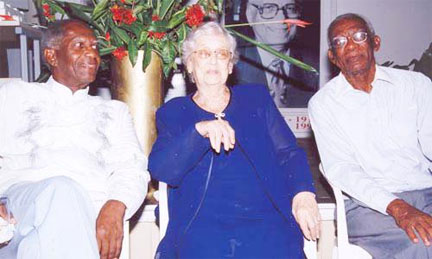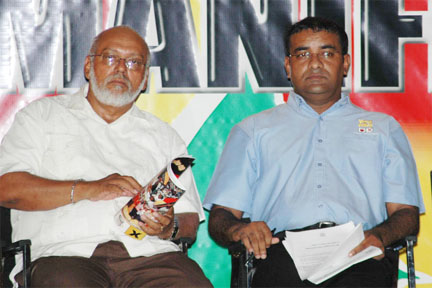As the People’s Progressive Party celebrates its sixtieth anniversary, tensions rise, rifts reopen, rivalries are rekindled and the struggle for supremacy sharpens.
General Secretary Donald Ramotar emerged as the star of the show when People’s Progressive Party devotees congregated to celebrate the 60th anniversary of the Party’s establishment on 1st January 2010 with a special Old Year’s night ball at Castellani House. Meanwhile, President Bharrat Jagdeo traipsed the circuit with the officers in Camp Ayanganna and Eve Leary but failed to show at the Party’s party. That was more than an oversight.

- Old folks: Ashton Chase, Janet Jagan and Brindley Benn in 2005
At sixty, the People’s Progressive Party is in its old-age crisis. Even as Ramotar boasts about the plans for the anniversary observances with the opening or activation of offices in all of the regions – starting with Anna Regina, Bartica, Lethem, Linden – old cracks along the party’s fault lines are starting to reappear. The party is riven by rivalry as stalwarts of the ‘old guard’ rally to Ramotar and impatient adherents of the ‘new guard’ cluster around Jagdeo.
The stakes are high. This year might be a party anniversary but, next year, national elections must be held. Neither contestant is taking chances. The central issue is the selection of the party’s presidential candidate for the 2011 general elections. No choice has been announced but public agitation has started and the nomination question, though unspoken, has become deeply polarizing.

Old Guard
Symbolically, the latent factionalism burst into the open on New Year’s day, the party’s anniversary. A group of concerned members and supporters − giving their names as “Ganga Kawal, Basdeo Singh and 11 other PPP Diehards” − published a full-page “Open Appeal to Leaders and Members of the PPP” in a daily newspaper. The “Appeal’ claimed, among other things:
“We have heard many PPP members from various parts of the country privately condemning the President’s action against Navin [Chanderpal]. However, these condemnations will not bring changes if they remain separate individual actions unheard by the administration and the public. The removal of Navin is an attack on the PPP. We believe it is part of a scheme to undermine the ranks of the PPP which are loyal to the policies of Dr Jagan. We cannot be sure what are the plans of the President in relation to 2011. What we are concerned about, however, is that the PPP hard core is being marginalized in the government and a new band, termed by one commentator as “the new private sector,” is becoming dominant and all-powerful. In the process, the image of the PPP is being tarnished. This government is repeatedly taking actions which are inconsistent with the working people ideology of the Party of Dr Jagan.”
The Appeal ends with the words “If you do not stand up, you will betray Dr Jagan. If you betray Dr Jagan, you will fail your great party and the Guyanese people.”
Navin Chanderpal, the subject of the ‘Appeal,’ had been serving as Science and Environmental Adviser to the President and his services were terminated for undisclosed reasons. Chanderpal is a long-standing member of the Party’s Executive and Central Committees. When asked about the matter, Ramotar, careful to draw the lines, safely pronounced, “Whatever the issue with Chanderpal, I see it as a separate issue…as a question of governmental stuff…at the level of the government, whatever relationships exist there. But, as far as the party is concerned, we never had any problem with Chanderpal and Chanderpal remains a leader of the PPP.”
The plot soon thickened. Within days, the Guyana Agricultural and General Workers Union led by Komal Chand, another party stalwart, union president and member of the ‘old guard,’ announced the establishment of the GAWU Labour College. He promptly advised that Chanderpal had already been appointed its principal. The opening was scheduled for the month of March as a tribute to Dr Cheddi Jagan. The implications are clear.
Observers suggest that the anti-Jagdeo newspaper ‘Appeal’ genuinely represents the opinions of the party’s silent majority of members who are reluctant to criticize the President publicly for fear of retaliation and victimisation. The GAWU initiative, clearly is a rebuff to Chanderpal’s former employer. By associating the College with Jagan’s memory, Chand ensures that it will remain beyond criticism and provide a rallying point for the ‘old guard.’
New Guard
Jagdeo’s control of the state media, the cultivation of the persona of an international celebrity and his excessive foreign travel have succeeded in creating an image in the public mind of a statesman who alone can represent Guyana on the world stage. No one can compete with that media blitz that accompanies the President’s travels. There is no doubt that he has attracted a band of new entrepreneurs around him.
Months before the ‘Diehards’ published their ‘Appeal,’ Jagdeo’s supporters surreptitiously started their campaign for him to be allowed to run for another presidential term, even though this is prohibited by the Constitution. The Jagdeo group calling itself the ‘Guyanese Coalition for Jagdeo Third Term’ launched a pricey publicity campaign involving the erection of a billboard, the distribution of posters, flyers and buttons and the publication of dubious opinion polls suggesting that Jagdeo would be re-elected. The flyers, under the caption “We Support a Third Term for Jagdeo,” stated:
“We the people of Guyana admire President Bharrat Jagdeo for his visionary, courageous and astute leadership over the years. We need Jagdeo to continue the developmental path for a modern, peaceful and prosperous Guyana. In this respect, we are prepared to utilize the constitutional mechanisms to a third term as President of the Co-operative Republic of Guyana.”
They ended with the statement: “Jagdeo! Our Choice for 2011.” The button that was distributed carried the words “Jagdeo 3rd Term” printed in red on a white background. Posters were plastered on walls with the slogan, ‘Jagdeo for President in 2011’.
Ramotar was obliged to denounce the Coalition’s activities. He pointedly refuted allegations that the PPP might have been behind the silent campaign which seemed to have been gathering momentum. In the final analysis, the huge billboard on the Avenue of the Republic was pulled down and the campaign was halted, at least for the time being.
Jaganism
The factionalism that is evident at present has many parallels in the PPP’s past. From the start, the party always comprised a congeries of cliques and interest groups, often with irreconcilable interests. In the earliest days, there was always a ‘Left’ faction led by Cheddi and Janet Jagan and a ‘Right’ faction led by Forbes Burnham. By a series of internal manoeuvres in 1955-56 the Jagans succeeded in purging their rivals who they accused, variously, in the communist jargon of the day, as being guilty of “right and left opportunism.”
After further expulsions and defections throughout the 1960s, the Jagans decided to transform the party from the loose, mass-based congeries into an efficient electoral machine in 1969. The PPP declared that it recognised “that a Marxist-Leninist party was essential to the attainment and retention of revolutionary, anti-imperialist political power and the building of a socialist society [and] decided to transform itself from a loose, mass party into a disciplined Leninist-type party.”
This move had the effect not only of implanting orthodox Marxism-Leninism but also of introducing the communist practice of ‘democratic centralism.’ This practice enhanced the General Secretary’s control of the party’s apparatus. It proved useful in containing conflict among various interest groups – farmers, businessmen, professionals – and restraining rivals for the leadership. As a component of democratic centralism, indirect election of party leaders prevented recalcitrant and refractory members from ever attaining high office. Election to the executive committee became extremely difficult, and as many popular aspirants learnt the hard way, support by the ordinary delegates at congress does not necessarily translate into support for election to the executive committee.
Although it is quite evident that collective decision-making is practised at the level of the executive committee, the question of the nomination for the presidential candidate in the forthcoming general elections seems to be too important to be left to the uncertainties of democratic choice. Because the central and executive committees control the party organisation between congresses, both Jagdeo and Ramotar realise that whoever controls the executive committee will influence the modalities for the selection of the candidate. Since the PPP expects to win the general elections, the candidate so elected will control the country.
The system
Two other factors will influence the party’s response to the current internal crisis. The first is the personality cult which was fostered by the Marxist-Leninist party system. The cult was employed to unify the party around the saintly image of Cheddi Jagan. For, despite his faults, he did work hard to build up the party the old-fashioned way − by personal contact, keeping promises and building trust among his followers, the majority of them the rural poor. Jagdeo tried to benefit from this cult. He is still perceived as a member of the monied classes rather than the poor masses. He is yet to do the groundwork, especially among the rice farmers, cane cutters, fishermen and small storekeepers who form the bulk of party membership.
The second factor is the prevalence of presidential patronage. Favours have become a useful instrument of social control. They are capable of neutralising the hostility of union leaders, ethnic, religious and social critics and of caponising opposition politicians. One of the reasons why party members are reluctant to criticize Jagdeo is because they fear the denial of patronage.
As the authors of the ‘Appeal’ averred, the administration has come to be seen as having reduced the state into a plaything in the hands of a commercial cartel. Since the elections of 2001, there have been growing criticisms of the administration as having become more authoritarian and more corrupt.
There has also been a phenomenal surge in narcotics-trafficking, money-laundering, fuel smuggling and gun-running and the threats to human rights and human safety. Most of these abuses and illegalities have come to the attention of foreign institutions which report annually on these adverse conditions in Guyana. Critics also point to the decline in respect for the National Assembly, the undermining of the impartiality of the Public Service and the erosion of the professionalism of the Security Services.
As the PPP celebrates its 60th anniversary, the struggle between the ‘old guard’ who revere Cheddi Jagan and the ‘new guard’ who admire Bharrat Jagdeo is approaching its final stage. The victor’s character will determine the country’s destiny.
